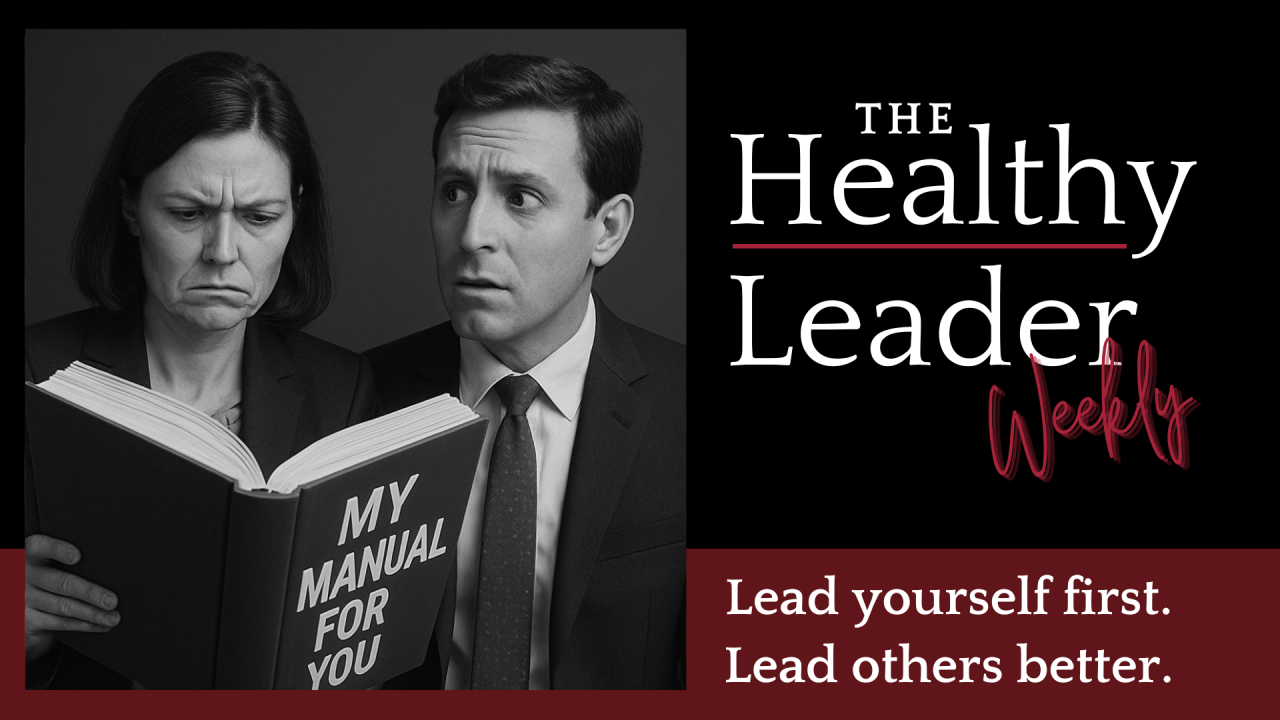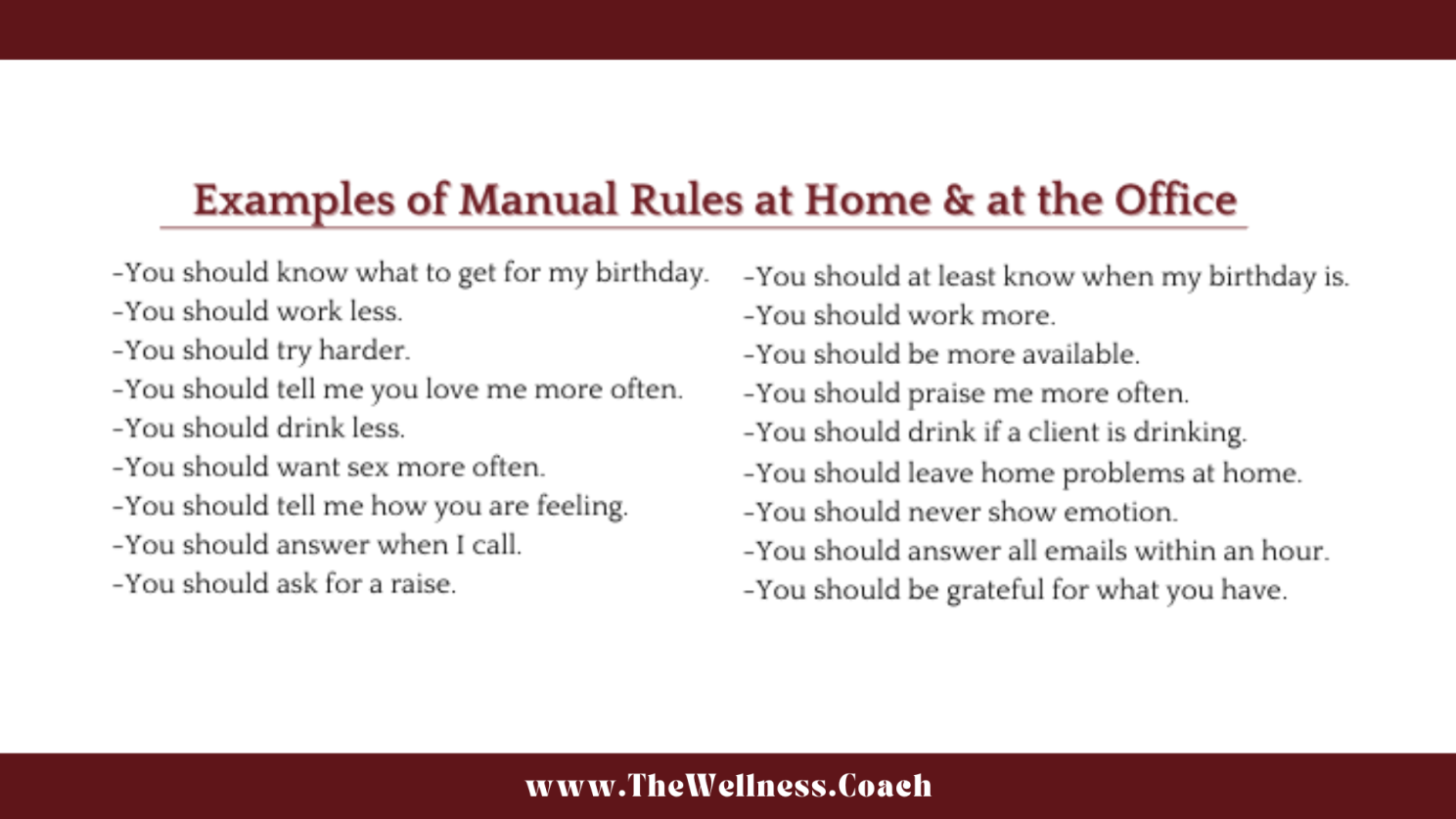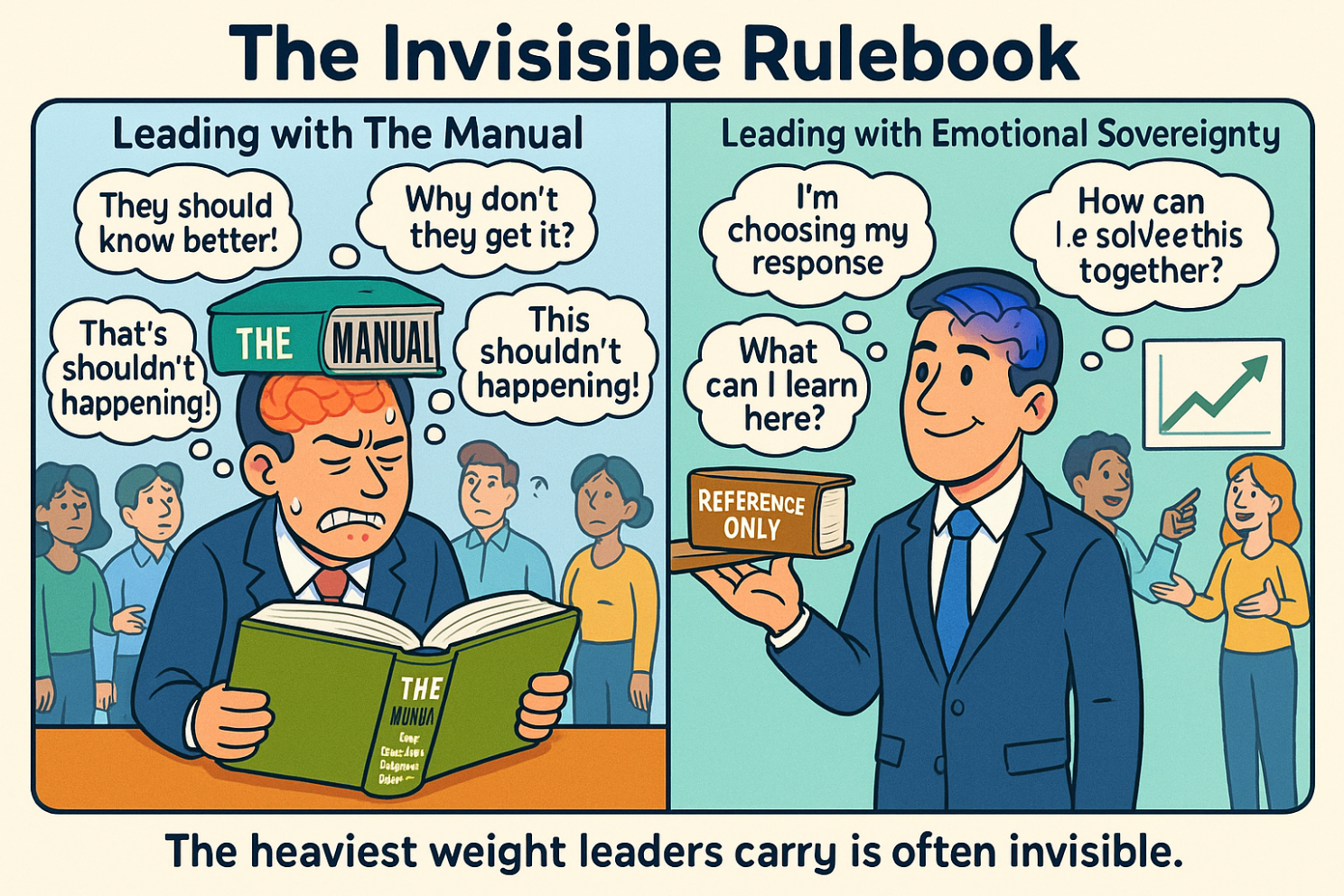The Hidden Cost of Expectations: Breaking Free from Your Mental Manual

You're at your daughter's softball game, trying to put on a happy face. But the day's frustrations loop endlessly in your thoughts. Your boss didn't acknowledge your hard work. Your spouse forgot to mention this game until the last minute. And your colleague? You're pretty sure they're going to bail again, leaving you with more work tonight.
"If only everyone would just do what they're supposed to," you think, seething quietly.
And just like that, you've checked out. You're sitting at the game, but your mind is running through all the "shoulds" others need to follow to make your life easier:
- My partner should have put this on the calendar weeks ago.
- My boss should have recognized the hours I put in.
- My colleague should be more dependable.
That internal dialogue—irritation, frustration, even resentment—feels personal and unique, but it's just a variation of familiar themes from an invisible rulebook.
I call it The Manual—an unspoken script for how others should behave so you can feel secure, validated, and at peace. The catch? Most of the time, we don't even know The Manual exists. We move through our day, silently judging others, unaware of how deeply this script is running. It feels like "just the way things are," but it comes at a cost.
What A Manual Can Cost You
Whether it's a $2 frustration or a $2 million business problem, the effect is the same: Expectations get missed. Energy gets wasted. Distraction takes over.
Take a $2 example. You stop by your favorite coffee shop, and the barista spells your name wrong on the cup—again. It's minor, barely a flicker of irritation. But then someone won't let you back out of your parking spot. You hit traffic. You're running late—again. Suddenly, you turn The Manual inward: I should have left earlier. I should have planned for this.
The result? Those minor irritations trigger your nervous system, spiking cortisol and ramping up stress. Neuroscience shows these micro-stressors accumulate, priming your body for anxiety and tension. And it doesn't just cost you health—it costs you productivity, connection, and sometimes, real dollars when it leaks into team dynamics.

Now zoom out to a $ 2 million example. Sarah, a tech CEO I worked with, couldn't understand why her executive team was unraveling. Despite competitive pay and exciting projects, tension was building, and communication had broken down.
"They just don't get it," she told me. "I shouldn't have to spell everything out. They should anticipate what needs to happen next."After speaking with key team members, it was clear her expectations were unspoken—an invisible rulebook she'd been holding them to without realizing it. Her Manual was costing her company in lost momentum and stalled projects.
Together, we uncovered two unwritten rules:
- "A good leader should be able to anticipate my needs without constant direction."
- "If I have to tell them what to do every step of the way, they're not experienced enough."
Her breakthrough came during a tense executive meeting. When her CTO proposed a different solution, irritation flared. That's not how it should be done. They should know better. But instead of reacting, she paused. She recognized her Manual firing up—those unwritten expectations surfacing.
That conscious choice—to choose curiosity over frustration—sparked new conversations and helped her expand what Carol Dweck calls a Growth Mindset: the belief that abilities can be developed through dedication and openness. Sarah began to shift from rigid expectations to curiosity and collaboration.
The impact was undeniable—not just in smoother communication, but in renewed momentum and measurable savings. Projects that had stalled began to move forward, and team stability returned. What had once felt like constant friction now opened the door for progress.
"I'm not managing people anymore," she told me. "I'm managing my response to people. It's a completely different game."
Your Brain on Expectations: The Neuroscience of Reactivity
Let's be clear: recognizing The Manual won't magically fix every leadership challenge, but it's a critical first step. Why? Because noticing these silent expectations is like flipping a switch in your brain. It's called meta-awareness—the ability to observe your own thoughts instead of being consumed by them.
When The Manual is firing, you're operating from your limbic brain—the part designed to detect threats, triggering emotional reactivity. Dr. Michael Frisina explains it simply: "You can't be in your limbic brain and your prefrontal cortex at the same time." When you're reactive, you're locked out of strategic thinking, empathy, and problem-solving.
But the moment you recognize The Manual is in play, you disengage from the limbic loop and re-engage your prefrontal cortex—the command center for executive function, innovation, and emotional regulation. Meta-awareness makes this possible.
When you lead from the upper brain, your body releases dopamine, enhancing focus and motivation, while cortisol—the stress hormone—drops. Over time, this shift strengthens neural pathways for clearer thinking under pressure. You stop reacting and start responding. This isn't just a mindset shift—it's a neurological one.
And it's not just about feeling better—it's about performing better. When you're leading from your upper brain, you're better able to lead others. Research by Gallup shows that leaders who prioritize strengths-based development and authentic relationships see up to 29% higher profits, 19% increased sales, and a staggering 72% lower attrition rate among their teams. When you lead from the upper brain, you're not just shifting your own thinking—you're reshaping the way your team collaborates and performs.

"Why Create a Strengths-Based Company Culture?" CliftonStrengths, Gallup.Com
The Illusion of Control: Why Your Manual Keeps You Stuck
When you first recognize The Manual, the instinct to defend it can be overpowering. You might think: People should respect my time. They should understand my priorities. They should carry their weight. And you might be right. But clinging to that invisible script means clinging to the illusion of control.
When we invest energy in how others "should" behave, we step into a futile power struggle with reality. Byron Katie puts it perfectly:
"When you argue with reality, you lose—but only 100% of the time."
Neuroscience agrees: the brain craves predictability. It finds safety in familiar patterns, so when someone steps outside the script, it triggers the amygdala, sparking frustration or even rejection.
But what if The Manual is the very thing keeping you disconnected? What if, instead of waiting for someone to flip to the right page, you dropped the manual entirely? What if you shifted from demanding change to embracing acceptance and emotional sovereignty?

From Expectations to Empowerment: Claiming Your Emotional Freedom
Here's the transformative truth: our emotional experience is not dictated by what others do or don't do. It's defined by how we think about it. This is emotional sovereignty—the recognition that your emotional state is determined by your own thoughts, not someone else's actions.
Imagine this shift: Your partner forgets your anniversary. The old script fires up: They don't care. I'm not important. But what if you chose differently? What if you allowed them to be fully human—flawed, forgetful—and chose compassion over frustration?
Emotional sovereignty is not about lowering your standards; it's about releasing the invisible grip of expectation. It's about shifting from they should change to I can choose my response. And that's where real power lies.
The Manual-Free Leadership Advantage
The most powerful shift in leadership isn't found in another strategy or framework, it's in releasing the invisible script that keeps you trapped in reactivity.
When you trade expectations for emotional sovereignty, you don't just feel different, you lead differently. Your prefrontal cortex activates. Your team dynamics transform. Results follow.
The question isn't whether you have a Manual—we all do. The question is: are you ready to put it down and pick up something better?
Your next level of leadership is on the other side of that choice.
Traci Fisher is the CEO of The Wellness Coach and creator of The Healthy Leader Operating System™. She helps healthcare executives build neurologically-informed leadership practices that transform reactivity into responsive presence. By combining prefrontal leadership techniques with practical emotional sovereignty tools, her clients achieve measurable improvements in team performance, retention, and bottom-line results.
A West Point graduate and former Army helicopter pilot, Traci applies military precision and neuroscience expertise to help leaders navigate complexity with clarity and purpose. Learn more at www.thewellness.coach.